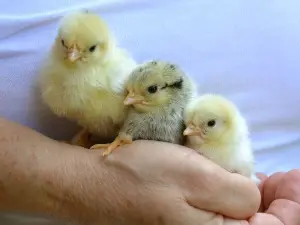
Chicks are similar to human babies in that they are nourished as they develop, in the egg or womb, through their navels.
The navel closes up by the time the chick hatches, or rather, it should.
This article looks into why your chick has hatched with an open navel.
Table of Contents
Chick hatched with an open navel:
A chick hatching with an open navel will understandably be very concerning to you if you’re raising baby chicks.
Here is why this happened with your baby bird:
What it is:
Your bird hatched with an open navel because there were issues during the incubation process.
The developing chick and the yolk sac are separate items but are connected in the egg at the bird’s navel.
The chick is nourished by the yolk sac as it develops
When chicks are about to hatch, they absorb the yolk through their navel. The navel is meant to close up before the bird hatches.
If this absorption does not happen fully, or, if the navel does not close fully then the bird will hatch with an open navel.
This can be dangerous as an open navel can easily become infected with bacteria.
An infection can cause the bird to become ill and quickly kill the bird.
If the bird recovers then there is a chance that it will have a weak immune system and will be at a higher risk of developing an infection.
Why this happened:
Reasons why your birds will have any issues around hatching time, are usually because of the temperature or humidity settings.
If the temperature in your bird’s incubator was incorrect during the incubation process, if the temperature was too low, then your bird may hatch with an open navel.
This can also happen if the bird’s body isn’t given enough time to close the naval before the chick hatches from the egg.
In addition, if the hatching process is too slow then the bird’s body will not have enough time to close the navel before the bird hatches.
What to do:
If you want your chick to have a fighting chance you’d need to isolate the bird and let its navel close up.
Isolating the bird is important as this will keep the other chicks from pecking at the navel as it tries to heal.
Isolation will also keep the bird from becoming stressed or anxious so it can recover in peace.
Make sure that you disinfect the area that you’ve chosen to isolate the bird in. Doing this will lower the chances of infection.
The bird’s open navel should close up about an hour or so after hatching.
If the navel is not closing up some suggest that you clean your hands before touching the bird, disinfect the bird’s abdomen, and then close the cavity shut using a small drop of super glue.
However, we suggest that you rather get professional help for your chick.
Choosing to seek professional help from your vet may be best for your young chick.
If you can get the bird to an avian vet then this will be even better.
If you enjoyed this article then you may also be interested in other bird related articles. Here are some articles that you may be interested in: Why Does My Bird Open His Mouth When I Pet Him?, Why Is My Canary Whimpering?, Pipped Egg Rolled Over, What Do Birds Sharpen Their Beaks With?, Canary Sleeping With Its Head Down, Why Do Birds Adjust Their Crop?, Bird Opening Mouth And Stretching Neck, Why Does My Lovebird Rub His Beak On The Cage, Can Baby Birds Drown In The Nest

